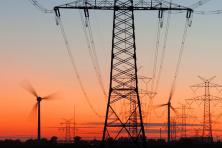Did you hear the news that Governor Kotek signed the most comprehensive climate action package in Oregon history into law earlier this month? So, what all passed, and why does it matter? Here’s a rundown of the critical legislative victories that reduce climate pollution, scale up our clean energy transition, and create more resilient communities across Oregon.
We saw success despite a challenging legislative environment that included a minority of Senators leading the longest walkout in Oregon’s history. Because the legislative calendar was down to the wire, many climate and clean energy bills were combined into two omnibus bills collectively called the “Climate Resilience Package” that passed in the waning days of session. Investing $90 million total in the annual Climate Budget with a laser focus on leveraging up to $1 billion in federal climate funding, the combination of this legislation will increase the deployment of heat pumps, solar panels, storage, electric trucks, and buses, make energy efficiency and clean energy more affordable, support the build-out more renewables and microgrids, sequester carbon in our forests and farms, and help the state plan to reach our 100% clean goals. All of this brings a just, equitable, and rapid transition from fossil fuels to clean energy closer within reach while increasing the resilience of our communities.
These bills made it across the finish line thanks to an unrelenting coalition effort with many fellow climate advocates, frontline communities and environmental justice leaders, key business support, unwavering legislative champions like Senator Kate Lieber and Representative Pam Marsh, and all the support you all provided for this effort. As we find ourselves in the middle of yet another “impact season” (formerly simply known as summer) chockfull of deadly heat waves, wildfires, and smoke, it's essential to understand what the state is doing to address this unfolding crisis and position Oregon as a leader in the clean energy transition.
Here’s a rundown of what was in the Climate Resilience Package that just became law here in Oregon:
HB 3409: Climate Resilience and Sustainable Communities
- Resilient Efficient Buildings Package:
- Healthy Heating and Cooling for All (SB 868): Sets a state goal to get 500,000 new heat pumps installed by 2030, with a priority for low-income and environmental justice communities. Leverages new federal incentives and existing state programs to accelerate heat pump adoption and increase weatherization and retrofits of homes, apartments, and businesses. Aligns Oregon’s energy efficiency programs with our state climate goals. Creates a workforce training fund at the Oregon Department of Energy (ODOE).
- Building Performance Standard (SB 869): Establishes a building performance standard for existing large commercial buildings across the state, which will reduce climate pollution and improve their energy efficiency over time.
- Build Smart from the Start (SB 870): Strengthens building codes for new construction to increase energy efficiency and resilience and encourage low-carbon building materials. Ensures our building codes help achieve our state climate goals.
- Smart State Buildings (SB 871): Ensures state-owned public buildings walk the talk on Oregon’s efficiency and climate goals.
- Electric Truck Rebates (HB 2714): Creates a new state rebate program for medium- and heavy-duty zero-emission vehicles like delivery and semi-trucks, transit, and school buses, anticipated to leverage federal funding from the Inflation Reduction Act.
- Community Resilience Hubs and Networks (HB 2990): Builds community resilience by creating hubs and networks across Oregon that activate before, during, and after climate disasters.
- Natural Climate Solutions (SB 530): Supports statewide forestland owners, farmers, and ranchers to implement climate-smart land management practices, improving Oregon communities’ resilience and natural resource economies while sequestering carbon.
- Siting Renewable Energy (HB 3181): Creates stakeholder process and collaboration between DLCD and ODOE to find opportunities and minimize conflicts when siting renewable energy projects in Oregon.
- Oregon Climate Action Modernization (SB 522): Supports staffing and expanded representation on the Oregon Global Warming Commission, renaming it the Climate Action Commission.
- Community Green Infrastructure Act AKA TREES Act (HB 3016): Provides funding to develop community green infrastructure projects. Provides technical and financial assistance to public bodies, tribal governments, watershed councils, and CBOs to respond to canopy damage due to pests, diseases, or other conditions.
- HB 3409 also includes:
-
- Woody Biomass for Low-Carbon Fuels (HB 3590)
- Reducing Harmful Algal Blooms (HB 2647)
- Climate Protection Program Oversight (HB 3196)
HB 3630: Shaping a Clean Energy Future
- Oregon Department of Energy (ODOE) “One Stop Shop” (HB 3166): Supports ODOE in establishing and administering two energy efficiency and home electrification programs to help efficiently and equitably allocate $114 million in expected federal funding to Oregonians.
- State Energy Strategy (HB 2534): Directs ODOE to develop a comprehensive state energy strategy that identifies optimized pathways to achieving the state’s energy policies, including 100% clean energy by 2040.
- County Energy Resilience Planning (HB 3378): Enables Oregon counties to apply for $50k each in grants from ODOE to support the development of energy resilience plans.
- Environmental Justice and Tribal Navigator (SB 852): Provides information about state and federal funding opportunities and technical assistance in developing energy projects for rural, Tribal, and other environmental justice communities.
- Residential Solar Rebate Program Extension and Investment (HB 3418): Extends popular rebate program for residential solar and storage projects through January 2029 and invests another $10 million. This program is also expected to receive significant federal funding soon from IRA’s Solar For All to leverage this state investment.
- Residential Heat Pump Program Extension (HB 3056): Supports implementation of the state’s Residential and Community Heat Pump Deployment Programs established by the 2021 legislature to bring much-needed heat relief to Oregon communities.
Other Significant Climate and Environmental Justice Wins:
- Community Renewable Energy Grant Program (HB 2021, 2021): As part of the Climate Budget, invests $20M more in community renewable energy and energy resilience projects such as microgrids and solar and storage projects, with at least half of the projects serving environmental justice communities.
- Clean and Healthy Routes to Schools (HB 3014, a.k.a. the “Bike Bus” bill): Helps school districts fund transportation alternatives beyond traditional school buses.
- Renewable Hydrogen (HB 2530): Defines green electrolytic hydrogen. Directs Oregon Department of Energy to help draw down federal funding and accelerate renewable hydrogen in a regionally-aligned, climate-smart way.
- Plastics Reduction and Polystyrene Ban (SB 543): Reduces plastic pollution by banning single-use plastic, PFAS, and Styrofoam food containers that have negative impacts on human health and our waterways.
- Fluorescent Bulb Ban (HB 2531): Oregon becomes seventh state to ban compact fluorescent lamps by 2025.
- Indoor Air Quality in Schools (HB 3031): Requires indoor air quality assessments of K-12 school facilities and supports HVAC upgrades and improvements.
- Electric Vehicle Charging Installation Training (SB 582): Ensures a high standard for safety in the electrical workforce for EV charging infrastructure installation and operation.
So what’s next?
Many of the investments in this policy package set up Oregon to maximize the federal funds available from the Inflation Reduction Act and Bipartisan Infrastructure Law, but more is needed. Other important proposed legislation didn’t get across the finish line, including sustaining funding for the state’s popular EV rebates and closing gaps in our 100% clean laws.
To address the climate crisis, clean up our air, and boost clean energy jobs, we must fully decarbonize our electricity grid and use those clean electrons to power our buildings, our industrial manufacturing, and the transportation sector (on this particular subject, check out our efforts to decarbonize fleet vehicles in Oregon and Washington through a business accelerator, Breaking Barriers Collaborative). We have most of the necessary technology, know-how, and cornerstone policies needed to achieve this clean energy transition in the coming decades. Unfortunately, we’re still moving at too slow a pace, and much more investment is required in order to ensure the transition is genuinely affordable, equitable, and at the scale necessary-- largely due to opposition of fossil fuel interests and their allies along with the inertia of the status quo.
What we accomplished this legislative session is moving the needle in the right direction, and we are proud to share in this major victory. Now, the work continues!





